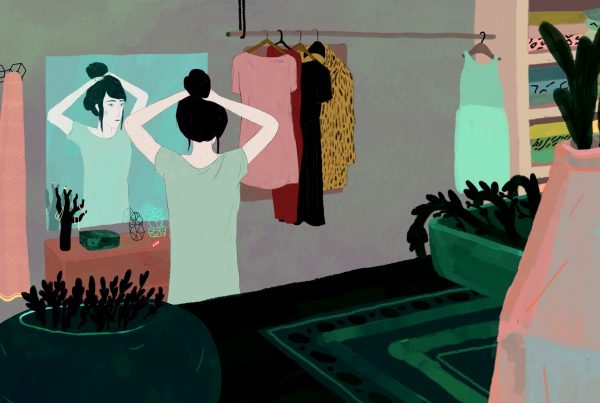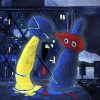Friday at Concorto has come and its main character will be music!
An extraordinary start at 6 pm at Palazzo Ghizzoni with the UBIK screenings. At 9 pm three short films wait for us at Parco Raggio: the Italian Supereroi senza superpoteri, then Symbiosis, an original journey within the feminine psyche and The Unseen River, that tells us the story of two couples connected by the river that flows nearby.
Then, the long-awaited live sonorization by Paolo Spaccamonti and Stefano Pilia of Dziga Vertov’s Man with a Movie Camera (1929).
In the greenhouse Supernature and Deep Night, while in the Boschetto some more nocturnal music.
Supereroi senza superpoteri – Beatrice Baldacci
Seen by Vanessa Mangiavacca
Re-using archive footage is a technique that is taking more and more hold, especially in the Italian short film reality. A means to echo past and melancholic eras, as well as delicate and suitable way to give shape visually to a thought: last year we saw Sara Fgaier’s Gli Anni, in this edition, we find the newcomer director Beatrice Baldacci’s work, which premiered at Venezia 2019 and won the Zavattini Prize. Supereroi senza superpoteri is a travel through time, an autobiographical, really intimate portrait covered with open wounds. The short, made with old VHS tapes showing Beatrice’s childhood and her relationship with the mother, recently passed away, touchingly celebrates her. The faded images portraying her are alternatively followed by short clips of Italian variety shows of the 80s and 90s: those decades during which television only was a big amusement park that almost legitimated to think that the years to come would have been loaded with certainty and somehow naivety. In the attempt to handle memory, remember forever an emotion, put nostalgia to rest and accept the end, Supereroi senza superpoteri tries to control all of this, a very personal and thus complex work, but yet really balanced.
Symbiosis – Nadja Andrasev
Seen by Margherita Fontana
Betrayed by her partner, a young woman sets out to look for his mistresses: the outcome will be a unique journey within the feminine psyche. The animation by the Hungarian Nadja Andrasev offers a portrait of the psychological mechanisms triggered by jealousy: emotional and sexual distance experienced by the couple results in the main character thoroughly investigating the Others. Who are they? What do they do? What do they wear? These questions accompany the young woman to a jungle inhabited by wild creatures, and right there the brilliance of the short is to be found: Andrasev chooses to represent jealousy not as simple rivalry and craving for possession but as symbiotic relation of imitation. A longing for sisterhood and identity, nothing to do with envy. Women and their animal sexuality are the focus of the narration, and not the womanizer, who is not by chance depicted roughly.
The Unseen River – Pham Nogoc Lan
Seen by Irene Pagano
Elegant, simple and visually stunning, “The Unseen River” by Vietnamese director Phạm Ngọc Lân tells the stories of two couples (a young, insomniac punk and his girlfriend, and an old fisherman and the woman he loved in his youth) both bound by the river they find themeslves by. Briefly put, this is the sort of film that is able to almost move you to tears with images of still water at night and soft instrumental music. It’s unexplainable how every shot can convey such a definite feeling, without loudness nor sheer explicitness. The faces of actors and actresses always seem to possess a sort of sculpture-like quality to them and, while never being distorted by strong emotions, they are extremely expressive and eloquent. It is a soothing film that speaks to the soul as much as to one’s aesthetic sensitivity. It dresses the viewer with the graciousness and angst of young, insecure love and with the melancholy sweetness of a long-lost one. Although it’s not obvious what the story holds at its core, whether it is a discourse on human existence and relationships or time or beauty, what one can detect from its surface is more than enough. In fact, it is something so pure it’s almost sublime.











Commenti recenti